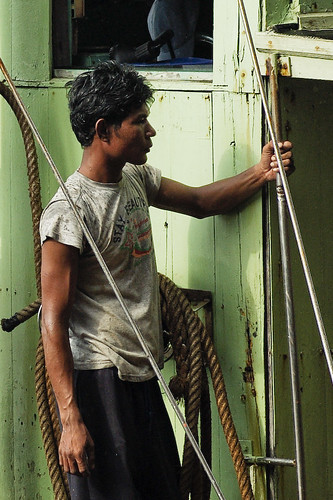_DSC1518
The research arms of the Department of Fisheries (DOF) is the Marine Fishery Resources Development and Management Department (MFRDMD) in Chendering, Terangganu. MFRDMD acts as a center to plan, coordinate and implement research on fishery resources in Malaysia and on regional fishery resources research programmes sponsored by South East Asia Fisheries Development Center (SEAFDEC). FRI is responsible for research on marine capture fisheries, marine aquaculture and ecology, with seven branches of various special areas of research.
Location
Chendering Fisheries Garden,
Kuala Terengganu
21080 Kuala Terengganu
Terengganu, Malaysia
My opinion:
The choice of lens does not signify anything except for the fact that it is only an instrument to capture the moment, if using a tele lens has better chance of capturing the moment isolated from the background and if it improves the chance of being unnoticed then so be it... I use a 70-300 and a 18-55 and shoot from a distance or from close range... but it is true that a street photographer cannot afford to be shy or be afraid to confront or pacify his subject in situations.
I like to capture fleeting moments, candid portraits and this does not give me an option to introduce myself to my subjects with my visiting card before I take the shot... I believe that empathy for the subject - if important to the photographer - should show in his/her work... morality is a subjective issue, not an absolute one... I am not the one who can figure out whats on a person's mind if and as he knows that he is being photographed... did he like being photographed? Did he dislike but was too polite or shy to tell me that he didn't want to be photographed? Well... as long as I do not know, I assume implicit permission from my subject. If I wanted to find out explicitly I would be talking and not capturing the moments that I wanted to capture.
I wonder what would one do if he was required to obtain permission before he took the wonderful pictures showing the moods and moments of dogs. [this is not no imply that dogs are same or different from human beings as photographic subjects ;-) ].
As Elli Wallach said in the movie 'The Good Bad and the Ugly' - "When you shoot, you shoot, don't talk"...it was shooting of a different kind though but its principle applies to street photography as well.
But it is also true that the photographer can introduce himself to his subjects and win their trust and take pictures over weeks and months...this improves the chances of better framing, lighting and yet capturing the candid mood and the moment since the photographer is not viewed as an alien any more and can work at close range without worried about being spotted.Often I visit a place where I am familiar face now, at least to quite a few, and returning with gift prints helps to build a friendship. I can take pictures with the candid mood working at close range...sometimes point blank with a wide lens But that is fundamentally different from the pictures you take as you walk down the street while trying to keep yourself inconspicous.
Many beginner photographers think that people don't like to be photographed and this may be true in many places but from my experience in taking people shots in streets of Tokyo, New York and Calcutta, I can say that it is not generally true...many do like to be photographed, many dont even know if they are being photographed and most apparently dont care even if they know. There are a few who are paranoid about being photographed and certainly I am not going to let the moment pass by making such an assumption. If someone finds out - as sometime someone always does since not everybody can blend in like a fly on the wall - and expresses dissent, I shall respect that. Although, in some situations I have also asked permission before shooting.
The street is a public place and the photographer has as much right as the artist with a sketch book making sketches of people. The problem is that the barrel of the lens pointing at someone could have a different psychological effect than the brief glances of the sketch artist.
Street photography is not about photographing poverty, squalor or misery, it is not about photographing homeless people on the streets, it can show humorous, funny, sad, joyful etc moments. A true street photographer's natural instinct is to shoot first and to worry later.
Taken with a Nikon D50 and AF Zoom-Nikkor 70-300mm f/4-5.6G lens
Please visit my other sites
hackspot@flickr
fadzlymubin@flickr
Hackspot on Wordpress
Picasa Photo Album
shutterhack@blogger
shutterhack@flickr
Labels: AF Zoom-Nikkor 70-300mm f/4-5.6G, Chendering Fisheries Complex, Nikon D50, People, Photography, Portrait
